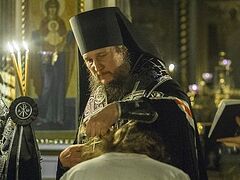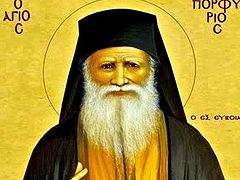In the name of the Father and the Son and the Holy Spirit. Amen.
The reading from Proverbs today began: My son, keep your father’s command, And do not forsake the law of your mother, and then we heard: For the commandment is a lamp, And the law a light; Reproofs of instruction are the way of life.
Here the wise Solomon is exhorting us to a life of humble obedience to the authority of our parents. He is calling us to make their path in life our path in life. And in the Genesis reading we see what happens when this exhortation is not heeded. The descendants of Seth, the third son of Adam and Eve, were to be righteous and walk with God. With Seth’s son Enos, men began again to call on the name of the Lord. However, although Seth and Enos had given them an example and a path of repentance to follow, their children did not follow in their footsteps. Here termed the “sons of God” because they were of the favored line, they turned aside from the path of their fathers and went after the “daughters of men,” that is, the daughters of the line of the accursed Cain, who ensnared them with their immodesty. And looking upon their iniquity, the Lord was grieved.
There are several meanings to this admonition of Solomon. Of course, we can understand it literally—the Fathers tell us that it is only rarely that the literal meaning of Scripture is discarded. From our youth up we are called to obey the rules of our parents. They are responsible for our upbringing and well-being and are more experienced than us, and most often they know better than us. And in the occasional instance that they are wrong, even our humble obedience to them will make them right. God blesses obedience.
Had the sons of Seth followed in the path laid out for them, God would not have needed to flood the earth. When we obey our parents, we are in some way placing ourselves on the path of Christ, for He perfectly obeyed both His Father and His Mother—not My will but Thy will be done—and when we obey our parents it teaches us and prepares us to obey others in our life.
The commands and laws of Solomon and other Israelites would of course have been to keep the Law of Moses, and so for us we can see in this passage also an instruction to be obedient to our fathers and mothers in the faith. As Orthodox, we all have our priest or spiritual father to whom we confess our sins who guides on the path to salvation in Christ. St. Silouan teaches us to accept the first word that comes from our spiritual father as being a word from God. If we weigh and discern their word and reject it, then our priests are not fathers, but become mere advice givers, and we trade in the Sacrament for a simple man-to-man conversation. We have denied the institution of God—the priesthood—and His ability to speak through it. But when we obey our fathers in the faith we are blessed by God.
And we obey our fathers in the faith because they guide us on the path of the Tradition of the Church, and here we see the foremost meaning of Solomon’s words—we are to keep the commands of God our Father, and the law of our Mother the Church. The two go hand-in-hand, for the Church is the very Body of Christ, and as St. Cyprian tells us, we cannot have God for our Father if we do not have the Church as our mother.
The path of God, as shown to us by the Incarnate Christ, is the path of humility. For us who are sinful, humility and repentance are one and the same. Fr. Zacharias of Essex says that to find true repentant prayer we need two things: right beliefs—to confess Christ as our only Savior—and right actions—we must truly follow the teachings of Christ.
To follow the teachings of Christ we must first accept them, as they come down to us by the Church. Orthodoxy is not interested in opinions, which are simply what we have when we haven’t yet fully placed our minds on the Cross with Christ. But more importantly, we follow the teachings of Christ by living according to them. Fr. Seraphim (Rose) tells us: “Orthodoxy is life. If we don't live Orthodoxy, we simply are not Orthodox, no matter what formal beliefs we might hold,” and Lent is a time for us to refocus our energies on making Christ our life.
By the inspiration of God our Father, our Mother the Church lays out for us a beautiful path of prayer, fasting and almsgiving, but we must resist the temptation to see these things as merely a system of commandments and laws, for they are in fact coming to us from, and showing to us a way of life—the life of Christ. The Church gives to us the very life of Christ Himself, if we want it.
We, the spiritual sons of Seth, the sons of God, must follow on this path laid out before us, and not turn aside to the daughters of men—that is, the sinful pleasures and philosophies of the world that tear us away from Christ. When we do not cut off sinful inclinations and temptations from their first appearance, when we do not dash our little ones against the stones, when we go in unto the daughters of men, then we give birth to giants within our hearts—to wicked habits that dominate our lives.
But our lives are given to us for repentance, and Lent is a microcosm of this repentant ethos. But unlike the people in Genesis, we do not have 120 years to repent—all we have is now and Lent calls us to repentance now. We may not even be here tomorrow, and so with each breath we pray: “Lord Jesus Christ, Son of God, have mercy on me, a sinner.” All of Heaven rejoices at one repentant sinner, and this is the ultimate triumph of Orthodoxy, when one heart is renewed for Christ.
Through this Lenten season may we find ourselves true sons of God, following the life-giving commands of our Heavenly Father.
In the name of the Father and the Son and the Holy Spirit. Amen.





